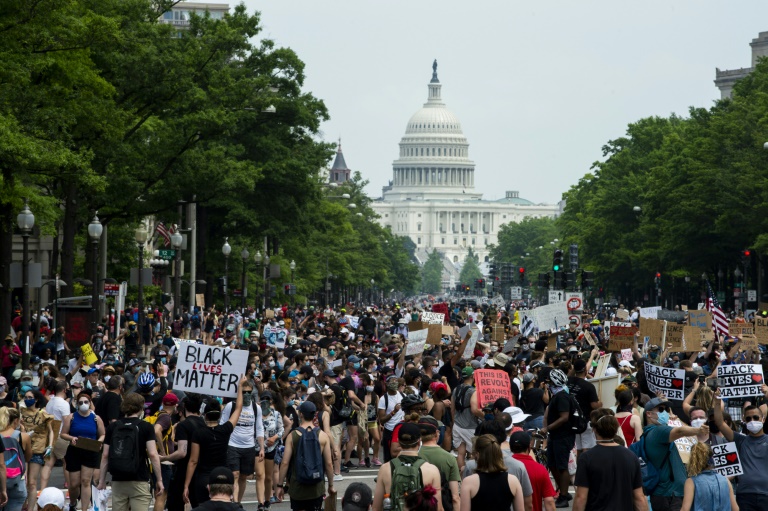Democrats vowed Sunday to press legislation to undo systemic racism in US law enforcement as the battle for change triggered by the police killing of George Floyd began shifting from the streets to the political sphere.
After another day of overwhelmingly peaceful protests across the US, President Donald Trump ordered National Guard troops to begin withdrawing from the nation’s capital.
More demonstrations were expected in scores of cities Sunday, as protesters began focusing their initial outrage over Floyd’s death into demands for police reform and social justice.
Trump’s tough approach to putting down protests continued to draw exceptional rebukes from top retired military officers, a group normally loath to criticize a civilian leader, reflecting a deepening of tensions between the Pentagon and the White House.
On Sunday, former chairman of the joint chiefs of staff Colin Powell joined them, saying Trump had “drifted away” from the constitution. Powell, a Republican moderate, said Trump had weakened America’s position around the world and that he would be voting in November’s presidential election for Democrat Joe Biden.
Read Also: Donald Trump Trolls Democrats As Bernie Sanders Quits
– ‘This isn’t a battlefield’ –
And Condoleezza Rice, who succeeded Powell as secretary of state under President George W. Bush, told CBS she would “absolutely” advise Trump against the use of the military to contain peaceful protest.
“This isn’t a battlefield,” said Rice, who was the first African American woman to be secretary of state.
But administration officials again defended their approach to the unrest, with acting homeland security secretary Chad Wolf telling ABC that Washington had been “a city out of control.”
He credited the decrease in violence to “what the administration has done” and he denied a problem of systemic racism among police.
While the administration has yet to propose any specific policy changes in response to the widespread outrage over Floyd’s death in Minneapolis, Minnesota, members of the Congressional Black Caucus (CBC) are expected to introduce legislation Monday designed to make policing more accountable.
Among other things, the legislation is expected to make it easier to sue police officers over deadly incidents; to ban the sort of choke holds that led to Floyd’s death; to require nationwide use of body cameras by officers and to establish a national database to record police misconduct.
– ‘A lot of work to do’ –
One member of the caucus, Representative Val Demings of Florida, who has been mentioned as a possible Biden running mate, elaborated Sunday on some of the changes she believes are needed.
“We have a lot of work to do, and systemic racism is always the ghost in the room,” Demings, formerly a police chief in Orlando, Florida, told ABC.
“What we have to do as a nation is hold police accountable, provide the necessary oversight to do that, look at training standards, look at use-of-force policies, look at who we are hiring, look at diversity” and craft legislation to ensure reform.
US Attorney General William Barr, however, said Sunday that he disagreed with any move to lessen the considerable legal immunity police officers enjoy.
“I don’t think you need to reduce immunity to go after the bad cops, because that would result certainly in police pulling back” from necessary enforcement duties, he said on CBS.
“It’s, you know, policing is the toughest job in the country.”
Barr defended the forcible clearing Monday of Lafayette Square in front of the White House shortly before Trump walked through it for a photo op in front of a nearby church, insisting — despite contradictory reports from many of those present — that some protesters had thrown bricks.
He also denied media reports that the president at one point had demanded that 10,000 active-duty troops be deployed in American cities to crack down on the unrest.
“The president never asked or suggested that we needed to deploy regular troops at that point,” he said. “I’m happy that we were able to avoid it on this occasion.”
Democrats have accused Trump of heightening division in the way he has talked about protesters, and one Republican, Rice, agreed.
She said he should “first and foremost speak in the language of unity, the language of empathy… (to help) overcome, not intensify our divisions.”
AFP
